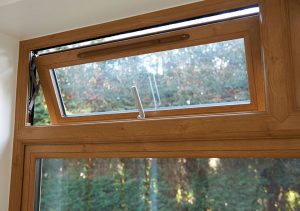
A historical pest to the windows and doors of British homes for centuries, condensation can be detrimental to a property’s health if not dealt with as soon as possible. Damp, mould, and rot can all arise as a result of condensation, leaving any family members in the home at risk of becoming ill. Thankfully, for as fierce an issue it can sometimes be, condensation is easily resolvable with sufficient glazing and ventilation integration.
What Is Condensation?
Condensation on windows is a common phenomenon that many homeowners encounter, especially during colder months. It occurs when warm, moisture air meets a cold surface, such as a windowpane, causing the water vapor to condense into liquid water.
To put it simply, condensation describes the state change experienced by water when it turns from a gas into a liquid. It’s especially common throughout Winter, when homeowners are tempted to heat their property from the inside, creating a lot of moisture-filled air that’s intent on landing on chilly surfaces, mainly windows.
While it may seem harmless at first glance, persistent condensation can lead to various issues such as mould growth, structural damage, and decreased indoor air quality. This can spread to walls surrounding the affected glazing, and before you know it properties go past the point of safe return. This is in the most extreme of cases, but always a possibility.
Condensation On Windows
Causes of condensation on windows include:
- Indoor Humidity: The primary cause of condensation on windows is indoor humidity. Activities like cooking, bathing, washing clothes, and even breathing release moisture into the air, increasing humidity levels inside the home.
- Temperature Differences: Condensation typically occurs when warm, humid indoor air meets cold surfaces, such as single-pane windows or poorly insulated glass. The temperature difference between the indoor and outdoor environment exacerbates the problem.
- Poor Ventilation: Inadequate ventilation increases indoor humidity levels, as moisture in the air becomes trapped indoors. This lack of airflow prevents the dispersion of humid air and contributes to condensation build-up on windows.
How To Stop Condensation On Windows
- Control indoor humidity – Invest in a dehumidifier to regulate indoor humidity levels, particularly in areas prone to moisture build-up such as kitchens, bathrooms, and basements. Additionally, using exhaust fans while cooking or showering can help minimise moisture accumulation.
- Stop condensation on windows! Improve ventilation – Ensure adequate airflow throughout your home by opening windows, installing trickle vents or exhaust fans, and using ceiling fans to promote air circulation. This allows moist air to escape, reducing the likelihood of condensation on windows.
- Upgrade windows – Consider upgrading to double or triple-pane windows with insulated glazing to minimise temperature differentials and reduce condensation formation. Proper insulation around window frames and sealants can also help prevent air leaks and moisture infiltration.
- Condensation on inside of windows? Use window treatments – Insulating window treatments such as thermal curtains, blinds or anti condensation paint can help control heat loss and maintain consistent indoor temperatures, reducing the likelihood of condensation on windows during colder months.

A+13 rated windows that are attractive as they are insulating
As well as keeping properties well insulated, windows and doors from the team here at DW don’t disappoint in terms of style or security. Integrating highly secure multi-point locking as standard with a range of hardware, colour tones, and styles to choose from, if you’re suffering from frequent condensation build-up you can rest comfortably that our frames combat this without the need to sacrifice other features.
Stamp out condensation once and for all with ventilated windows from DW
With over 10 years’ experience operating in the West Midlands, here at DW Windows we are more than familiar with helping homeowners stamp out the cold and prevent condensation. If you’d like to join them in this endeavour, call us on 0800 999 0909 or send us an online message and we’ll get back to you with a free quote.
Read our articles on condensation
- Do I Need Trickle Vents On My Windows? - March 18, 2025
- Popular Home Renovation Trends For 2025 - February 3, 2025
- Standard Window Sizes in the UK - January 14, 2025
Back to Top

